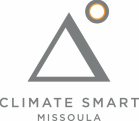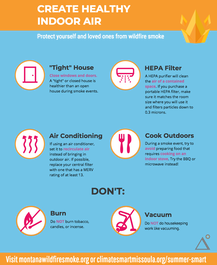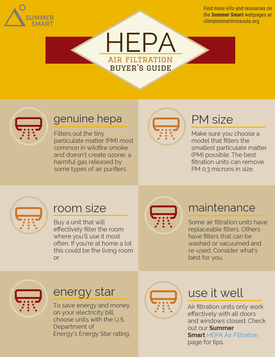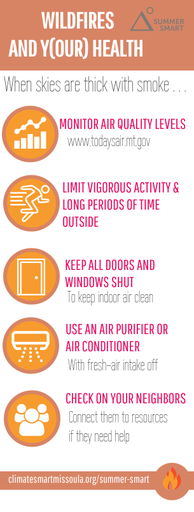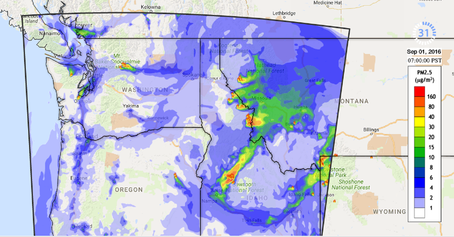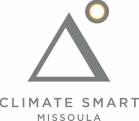|
|
Stay informed with the most updated information on today's (and tomorrow's) air quality:
|
Once you know the air quality, explore ways to stay healthy below:
|
The risk of wildfires and accompanying wildfire smoke is increasing and a longer fire + smoke season is projected from our changing climate. Missoula is particularly at risk due to our valley location. Learn about the health risks from smoke, as well as ways to stay healthy, by clicking on the buttons above or by scrolling down. Learn more about the science behind our changing summers.
We have resources to help you outfit your home for heat and smoke - and you can jump directly to our guide to HEPA portable air cleaners. |
2021 - What we're reading
2020 - What we're reading:
2020 Smoke-Ready Blog by Sarah Coefield, Missoula Health Dept.
|
What are the Health Effects of Wildfire Smoke?
|
What's so dangerous about wildfire smoke?
The video below, "Be Smart About Wildfire Smoke", explains who is most at risk and why. Common symptoms of smoke exposure:
|
Who is Most at Risk from Smoke?When thick smoke rolls in, it can affect everyone: we get grumpy because we can’t spend as much time outside, our throats hurt. While no one wants to understate the effects of smoke on all of us, some people are disproportionately harmed by wildfire smoke. In fact, about 1 in 3 Missoulians belong to a demographic that is particularly vulnerable to wildfire smoke. This includes children (especially the really little kiddos), pregnant women, seniors, and folks with asthma, heart, lung, or circulatory system disease - more than you would think! Read on to learn more about the risk, what health effects may be experienced during a smoke episode, and what to do to reduce risk .
ASTHMATICS
Potential Effects from Smoke:
CHILDREN (AGES 0 - 5)
Potential Effects from Smoke:
OLDER ADULTS
Potential Effects from Smoke:
PREGNANT WOMEN
Potential Effects from Smoke:
THOSE WITH CHRONIC HEART OR LUNG DISEASE
Potential Effects from Smoke:
THOSE WITH CIRCULATORY SYSTEM DISEASE
Potential Effects from Smoke:
What does that mean for me?
Smoke affects everyone differently, both physically and mentally. Even if you don’t appear to be experiencing symptoms, be extra cautious with how much time you spend outside and how active you are outdoors, especially if you’re a kid with developing lungs or a senior. If you have pre-existing conditions like heart or lung disease, wildfire smoke could have very specific health implications for you. Please speak to your healthcare provider. |
Preparing for Wildfire Smoke
For our most updated information on wildfire smoke and its relationship to COVID-19, visit our companion site, montanawildfiresmoke.org
|
How do you prepare for wildfire smoke?
The video below, "Prepare for Wildfire Smoke" shows how you can stay healthy during smoke events. |
Stay Healthy During Smoke EventsAlthough we don't have control over smoke entering our valley, there are things we can do to stay healthy and sane when smoke is here.
|
Do face masks help with wildfire smoke pollution?
Cloth masks do not work for pm 2.5. Particulate respirator masks, the ones recommended for Covid, and also known as an N95 or P100 mask, with two straps can filter out PM 2.5. Keep in mind that particulate respirator masks must fit tightly to work properly, so they actually make breathing more difficult and are not recommended for folks who already have trouble breathing.
Cloth masks do not work for pm 2.5. Particulate respirator masks, the ones recommended for Covid, and also known as an N95 or P100 mask, with two straps can filter out PM 2.5. Keep in mind that particulate respirator masks must fit tightly to work properly, so they actually make breathing more difficult and are not recommended for folks who already have trouble breathing.
RESOURCES
Downloadable Brochuresadditional one pagers
peer reviewed journal articles
Peer Reviewed Journal Articles:
|
Current and Forecasted Air Quality Information Not every wildfire smoke event is hazardous to our health. Smoke events range from the mild fog of a controlled burn to the thick, soupy haze of a raging wildfire. Usually, it's somewhere in between. To know what to do, you need to know the air quality.
Montana deq air quality website
Visit todaysair.mt.gov and click on the dot representing Missoula for current and forecasted air quality. Missoula health department report
know your rules of thumb
Look outside and check visibility:
Air Quality Specialist Sarah Coefield explains more:
call the missoula air quality hotline
A recorded message is updated daily during fire season. Call 406 - 258 - 3600 for more information. Real-Time Air Quality Forecast MapWondering when the air will improve? Check out this great map from Washington State University forecasting air quality for the next 48 hours. (Click on the image below to open the map - then zoom in to Missoula!)
|
